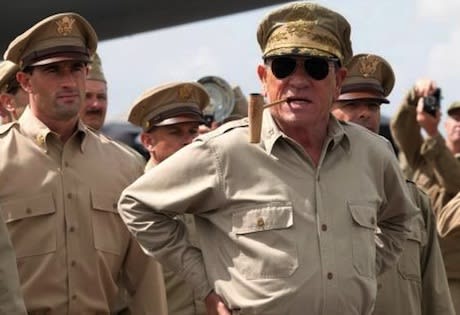Following the Japanese surrender at the end of WWII, the Americans (tasked with their traditional, cyclic, tendency to help a nation "rebuild" utilizing Western tenets) had to determine what to do with Emperor Hirohito, presumably the instigator of the Pearl Harbour attack.
At the time, this decision fell under the purview of General Douglas MacArthur (Tommy Lee Jones), a man with his own political motivations and guiding signifiers influencing the outcome, as determined by exploitable underling General Bonner Fellers (Matthew Fox), who physically conducted the investigation to determine if a trial was necessary.
Emperor (Peter Webber's historically and politically conscious biopic on the subject) isn't preoccupied with the specificities of war or the psychology of tragedy and defeat. It's a film that assumes the audience understands war and knows full well what happened in WWII in all theaters. It also assumes that we're conscious of the American tendency to police the globe sanctimoniously, stepping in wherever there's conflict to impose a rigidly defined sense of order.
Webber (Girl with a Pearl Earring, Hannibal Rising), a director known for deconstructing perspective and focusing on inner-conflict and motivation rather than drama, is interested in assessing ideological distinctions between Japanese and American culture. Initially, General Fellers has a distinctly black & white perspective on the nature of justice, questioning various political and economic leaders throughout Japan about the chronological and hierarchical facts that went into the decision to attack Pearl Harbour.
Noting early the Japanese tendency towards loyalty and honour over moral certainty, he's often left with cryptic answers in his interrogations, along with observations about the European, and by association, American, ethos of being territorial in the game of world domination.
While there isn't a specifically defensive reaction to the decision to bomb, there is a vague indication of unity and tradition being more substantive than sheer mechanics — the Japanese are more focused on Hirohito's decision to end the conflict and the national state going forward than the instigators of war.
The slow build of perspective change and broadening of mind in General Fellers are what drive the narrative forward. The theatrics are limited to mostly subdued conversations, with only the film's weakest conceit — a love story between Fellers and Aya (Eriko Hatsune), a Japanese exchange student he knew before the war — adding a melodramatic element.
Contemplation and an awareness of differing perspectives are the focus of Emperor, suggesting that what's more important than doting on the sheer spectacle and horror of war is the inner-emotional maturity needed to avoid it in the future.
While a hard sell, especially considering the sensationalist nature of the genre, it is an exceedingly thought-provoking work — if a little too on-the-nose — that excels in mirroring style with thematic assertion.
(Mongrel Media)At the time, this decision fell under the purview of General Douglas MacArthur (Tommy Lee Jones), a man with his own political motivations and guiding signifiers influencing the outcome, as determined by exploitable underling General Bonner Fellers (Matthew Fox), who physically conducted the investigation to determine if a trial was necessary.
Emperor (Peter Webber's historically and politically conscious biopic on the subject) isn't preoccupied with the specificities of war or the psychology of tragedy and defeat. It's a film that assumes the audience understands war and knows full well what happened in WWII in all theaters. It also assumes that we're conscious of the American tendency to police the globe sanctimoniously, stepping in wherever there's conflict to impose a rigidly defined sense of order.
Webber (Girl with a Pearl Earring, Hannibal Rising), a director known for deconstructing perspective and focusing on inner-conflict and motivation rather than drama, is interested in assessing ideological distinctions between Japanese and American culture. Initially, General Fellers has a distinctly black & white perspective on the nature of justice, questioning various political and economic leaders throughout Japan about the chronological and hierarchical facts that went into the decision to attack Pearl Harbour.
Noting early the Japanese tendency towards loyalty and honour over moral certainty, he's often left with cryptic answers in his interrogations, along with observations about the European, and by association, American, ethos of being territorial in the game of world domination.
While there isn't a specifically defensive reaction to the decision to bomb, there is a vague indication of unity and tradition being more substantive than sheer mechanics — the Japanese are more focused on Hirohito's decision to end the conflict and the national state going forward than the instigators of war.
The slow build of perspective change and broadening of mind in General Fellers are what drive the narrative forward. The theatrics are limited to mostly subdued conversations, with only the film's weakest conceit — a love story between Fellers and Aya (Eriko Hatsune), a Japanese exchange student he knew before the war — adding a melodramatic element.
Contemplation and an awareness of differing perspectives are the focus of Emperor, suggesting that what's more important than doting on the sheer spectacle and horror of war is the inner-emotional maturity needed to avoid it in the future.
While a hard sell, especially considering the sensationalist nature of the genre, it is an exceedingly thought-provoking work — if a little too on-the-nose — that excels in mirroring style with thematic assertion.
